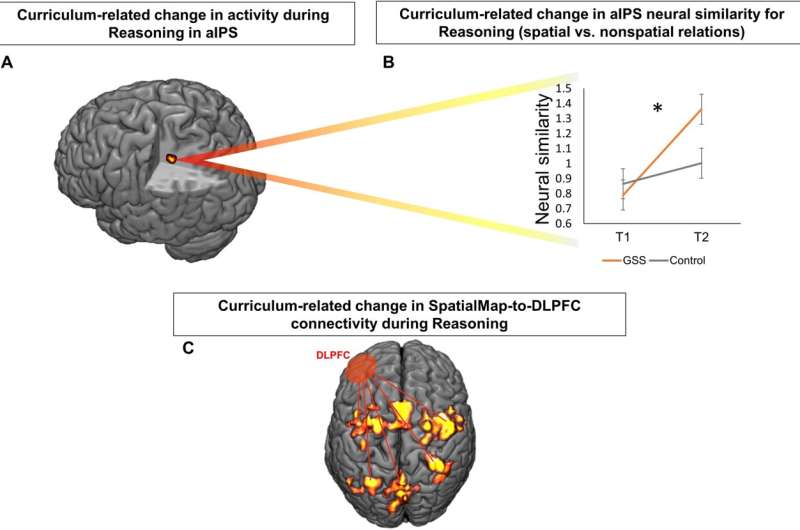Longitudinal neural changes during Reasoning. Relative to control students, Geospatial students showed greater longitudinal increase in aIPS activity within Neurosynth-based SpatialMap (A), increased representational similarity between spatial and nonspatial reasoning relations in this aIPS cluster (B) (*P < 0.05 and **P < 0.01, ns, not significant), and increased connectivity of SpatialMap to a DLPFC region meta-analytically implicated in syllogistic deductive verbal reasoning (C). Credit: Science Advances (2022). DOI: 10.1126/sciadv.abo3555
A team of researchers affiliated with several institutions in the U.S., has found that students taking a high school course designed to improve spatial cognition skills also got a boost in verbal reasoning skills. The study is published in Science Advances.
Over the past several years, psychologists have developed a theory that suggests that the part of the human brain involved in spatial cognition is also where verbal reasoning skills are processed. They suggest this came about as humans evolved improved spatial cognition skills as they increased their range. In so doing, they found a need to improve verbal reasoning skills to deal with the new social environment that developed as a result. In this new effort, the researchers tested the verbal reasoning skills of high school students who had incidentally signed up for a class that was designed to improve spatial cognition skills.
Students in the class were given tests designed to measure both their spatial cognition and verbal reasoning skills before and after taking the class. Another science class that did not involve spatial reasoning served as a control—the students in that class took the same tests. The researchers also subjected some of the students from each class to MRI scanning before and after taking their respective classes. The researchers then compared the results of the tests and the MRIs. They found that those students who took the spatial cognition improvement course saw a larger increase in their spatial abilities compared to the control group. But they also saw a larger increase in their verbal reasoning skills than the control group. The researchers found changes in the part of the brain that plays a role in both spatial cognition and verbal reasoning in the students who took the spatial cognition training course—but not in those students in the control group.
The researchers suggest that working to improve spatial cognition skills can lead to improvements in verbal reasoning skills, a finding that they point out should be of interest to both educators and parents, due to the increasing reliance of people of all ages on smartphone assistance with spatial cognition tasks—like figuring out how to get from one place to another.
More information: Robert A. Cortes et al, Transfer from spatial education to verbal reasoning and prediction of transfer from learning-related neural change, Science Advances (2022). DOI: 10.1126/sciadv.abo3555
Journal information: Science Advances
© 2022 Science X Network
























